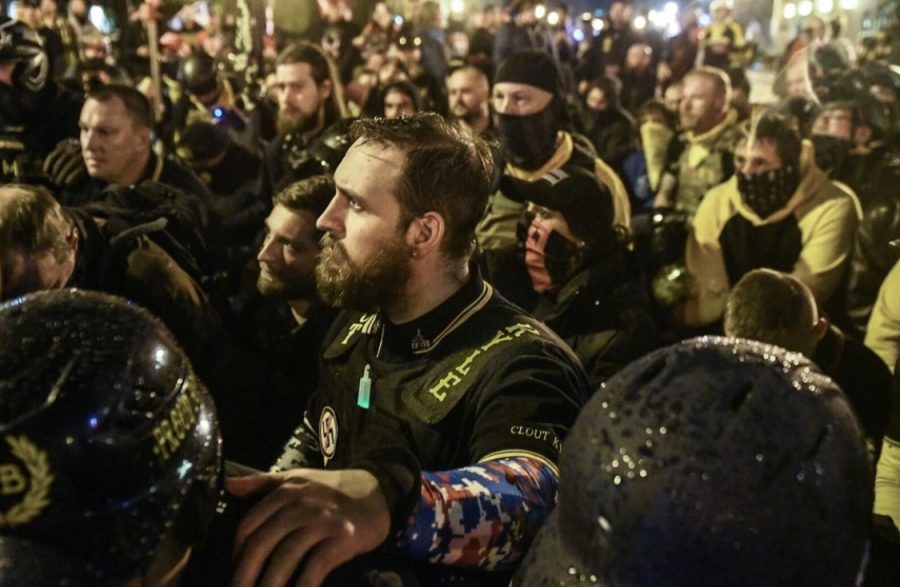American Conservatism Crosses Border Into Canada
Far right extremism from the U.S has started to infect Canadian politics.
As the GOP has shifted towards right-wing extremism and anti-federalism since the watershed presidential election of 2016, the Republican party’s political influence has infiltrated Canada’s political landscape. With the dramatic change in political rhetoric, members of the alt-right, a division of the far-right movement characterized by white supremacist values, began to organize themselves into violent groups and militias. One such group to rise to national notoriety is the Proud Boys. Stanford University defines the group as “an all-male, far-right extremist organization” with values stemming from Islamophobia, racism, anti-Semitism, homophobia, transphobia, misogyny and xenophobia.
Founded in 2016, the group garnered national attention and support by misrepresenting its mission as being anti-left rather than radically alt-right and riding the wave of social and political upheaval catalyzed by the Trump presidency. The decision to deliberately leave the organization’s objectives vague allowed for continuous news coverage and debate, especially because ex-President Donald Trump refused to denounce the group.
The group has grown exponentially, now with 72 chapters in the U.S. Furthermore, the hateful rhetoric within U.S. politics has led to the creation of international Proud Boys chapters in Australia, the U.K. and Canada. The introduction of the alt-right extremist group into Canadian politics also inspired support for other extremist groups in Canada, such as the neo-Nazi organizations Atomwaffen and The Base.
Today, the group is federally recognized for having ties to white supremacy by the U.S. and as a terrorist organization by Canada. The organization is simply a group of militant extremists living out their dreams of being vigilantes fighting to uphold the homogeneously white institutions of the Puritans.
Although the Proud Boys organization began in 2016, the organization was not heavily associated with being a terrorist entity in Canada until recently. With the outbreak of the COVID-19 pandemic, the Canadian government issued a vaccine mandate to quell its spread nationally. The mandate was met with immense political polarization because it did not align with the anti-federalist ideologies held by many Canadians. Similar to in the U.S., organizations such as the Proud Boys, Atomwaffen and The Base used the political unrest to wedge social and political division even further apart.
Alt-right organizations were able to garner support from movements protesting government-issued vaccine mandates by distorting the initially anti-federalist message and promoting radical anti-left concepts. Through the process of adding increasingly radical elements to the anti-federalist movement, the Proud Boys and other organizations effectively transformed and weeded out existing groups of protesters down to the groups of militant drones that have flooded the mainstream news cycle of the last two years with hate crimes.
Before the Jan. 6 insurrection, the Proud Boys’ chapters of Canada had long withheld from publicly presenting themselves as a group perpetuating hateful rhetoric. Canadian news outlets refrained from referencing the organization in the same breath as similar neo-Nazi organizations espousing white supremacy. Despite this, following the insurrection of the Capitol, Canadian officials were quick to bring down the metaphorical hammer of justice, designating all three groups to be federally recognized as “terror entities” and ordering the disbandment of the Canadian Proud Boys’ chapters. To a group of people determined to take change into their own hands, national recognition, negative or not, encourages the anti-federalist beliefs that led to large masses of people gathering to protest in the first place.
Although the groups no longer operate under the same names, supporters of the groups have organized themselves differently. Of the organized protests following the government’s designation of the terrorist organizations, the most notable was the “Freedom Convoy,” a protest against the recent mandate stating truck drivers traveling across the Canadian border to the United States needed to be vaccinated, which spanned seven days in January 2022.
Through the use of the right-wing crowdfunding website GiveSendGo, the “Freedom Convoy” amassed millions of dollars. However, on Feb. 16, 2022, the website was hacked, revealing data on the total amount collected in donations and where the money was being sent from. The data showed that of the $9.577 million, the “Freedom Convoy” crowdfunding page had raised, 18%, or $1.748 million, came from the top 1% of donors. Of those donors, the largest is Jim Hoft, the editor in chief of Gateway Pundit, a U.S. news outlet Wikipedia describes as a “far-right fake news website.” Although Jim Hoft was the most notable U.S. donor to the Canadian political protest, the leaked data traces over 1,100 donations back to accounts of people who had in the past supported other far-right organizations .
Beyond the “Freedom Convoy,” the level of political and social unrest in Canada is still very high. Most recently, the province of Alberta passed a bill rooted in anti-federalism into action that would reject federal sovereignty, allowing the region to reject or ignore any laws or regulations imposed by the Canadian federal government.
While the symbolism of the confederate flag and white supremacy as a whole feel unique to the American experience, the influence of the political climate of the U.S. expands past its borders. Additionally, not only does the polarization of the U.S. hold indirect implications for foreign nations, but, as seen in the leaked donation reports, those who hold political influence can directly play a role in the social and political development of Canada and other international territories alike.
Zachary Badalamenti, FCRH ’25, is a journalism major from Oakland, Calif.

Erynn Sweeney is a sophomore from Cypress, California, majoring in international political economy. She joined The Ram as a copy editor for Volume 105,...










































































































































































































